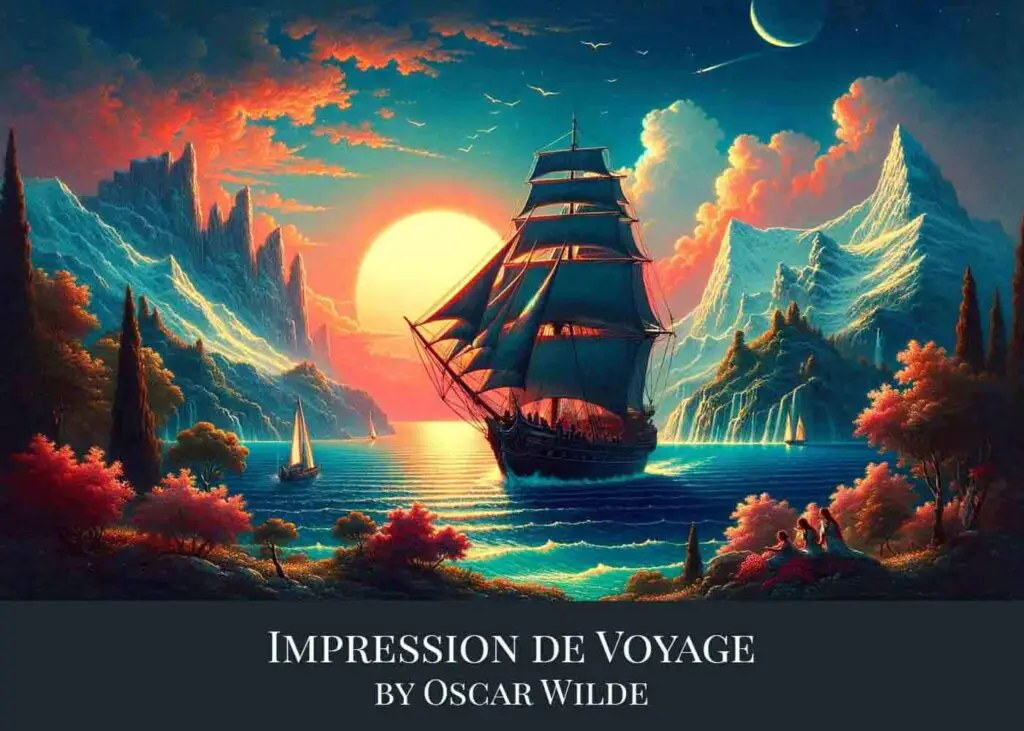
Impression de Voyage by Oscar Wilde
“Impression de Voyage” by Oscar Wilde is a beautifully vivid poem that captures the enchantment and historical richness of Greece through a seafaring journey. In this poem, Wilde uses rich and evocative imagery to transport the reader to the sapphire-colored seas and the sunlit landscapes of Greece. “Impression de Voyage” is part of Poems, a poetry collection that showcases Wilde’s lyrical talent. Those interested in exploring more of Wilde’s poetic works can find the Poems ebook available at PageVio.
1. The Poem
The sea was sapphire coloured, and the sky
Burned like a heated opal through the air;
We hoisted sail; the wind was blowing fair
For the blue lands that to the eastward lie.
From the steep prow I marked with quickening eye
Zakynthos, every olive grove and creek,
Ithaca’s cliff, Lycaon’s snowy peak,
And all the flower-strewn hills of Arcady.
The flapping of the sail against the mast,
The ripple of the water on the side,
The ripple of girls’ laughter at the stern,
The only sounds:—when ’gan the West to burn,
And a red sun upon the seas to ride,
I stood upon the soil of Greece at last!
Download Impression de Voyage Poster
Size: 8″ x 12″ (2:3 ratio)
Format: PDF
Copyright information: For personal use only
Note: Actual poster background color is white. For the sample poster, the background is made gray for illustration purpose.
2. Impression de Voyage Analysis
“Impression de Voyage” vividly portrays a sea voyage to Greece, blending natural beauty with classical references. Let’s break it down stanza by stanza:
First Stanza
“The sea was sapphire coloured, and the sky / Burned like a heated opal through the air;” – This line uses rich, jewel-like imagery to describe the sea and sky, suggesting both beauty and a sense of preciousness.
“We hoisted sail; the wind was blowing fair / For the blue lands that to the eastward lie.” – The journey begins with favorable winds, indicating a smooth and promising start. The “blue lands” to the east likely refer to the Greek islands and coastlines, known for their picturesque blue waters.
Second Stanza
“From the steep prow I marked with quickening eye / Zakynthos, every olive grove and creek, / Ithaca’s cliff, Lycaon’s snowy peak, / And all the flower-strewn hills of Arcady.” – The speaker observes various Greek landmarks. Zakynthos and Ithaca are islands in the Ionian Sea, with Ithaca famously associated with Homer’s Odyssey. Lycaon’s peak and the hills of Arcady evoke images of rugged, beautiful landscapes and classical myth.
Third Stanza
“The flapping of the sail against the mast, / The ripple of the water on the side, / The ripple of girls’ laughter at the stern,” – These lines focus on the sensory experiences aboard the ship – the sound of the sail and water, and the laughter, which adds a human element to the scene.
“The only sounds:—when ’gan the West to burn, / And a red sun upon the seas to ride, / I stood upon the soil of Greece at last!” – The poem concludes with the setting sun, a common symbol for the passage of time and the completion of a journey. The final line reveals the speaker’s destination and excitement at reaching Greece, a land rich in history and myth.
The poem is a celebration of the beauty and historical resonance of the Greek landscape, seen through the eyes of a traveler who is deeply moved by the journey and its destination. It also incorporates elements of Romanticism, such as a deep appreciation for nature and the sublime, and references to classical mythology and history.
3. Conclusion
If “Impression de Voyage” has sparked your interest, you might enjoy exploring this list of poems by Oscar Wilde.